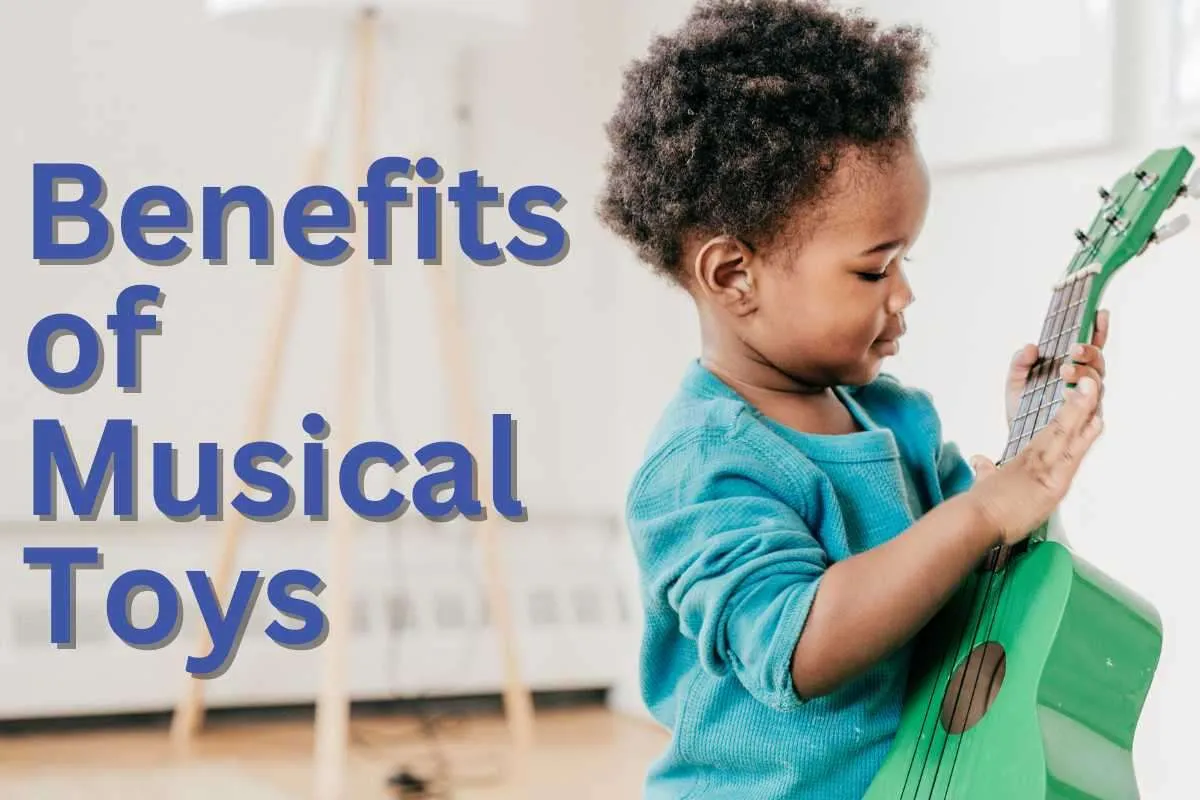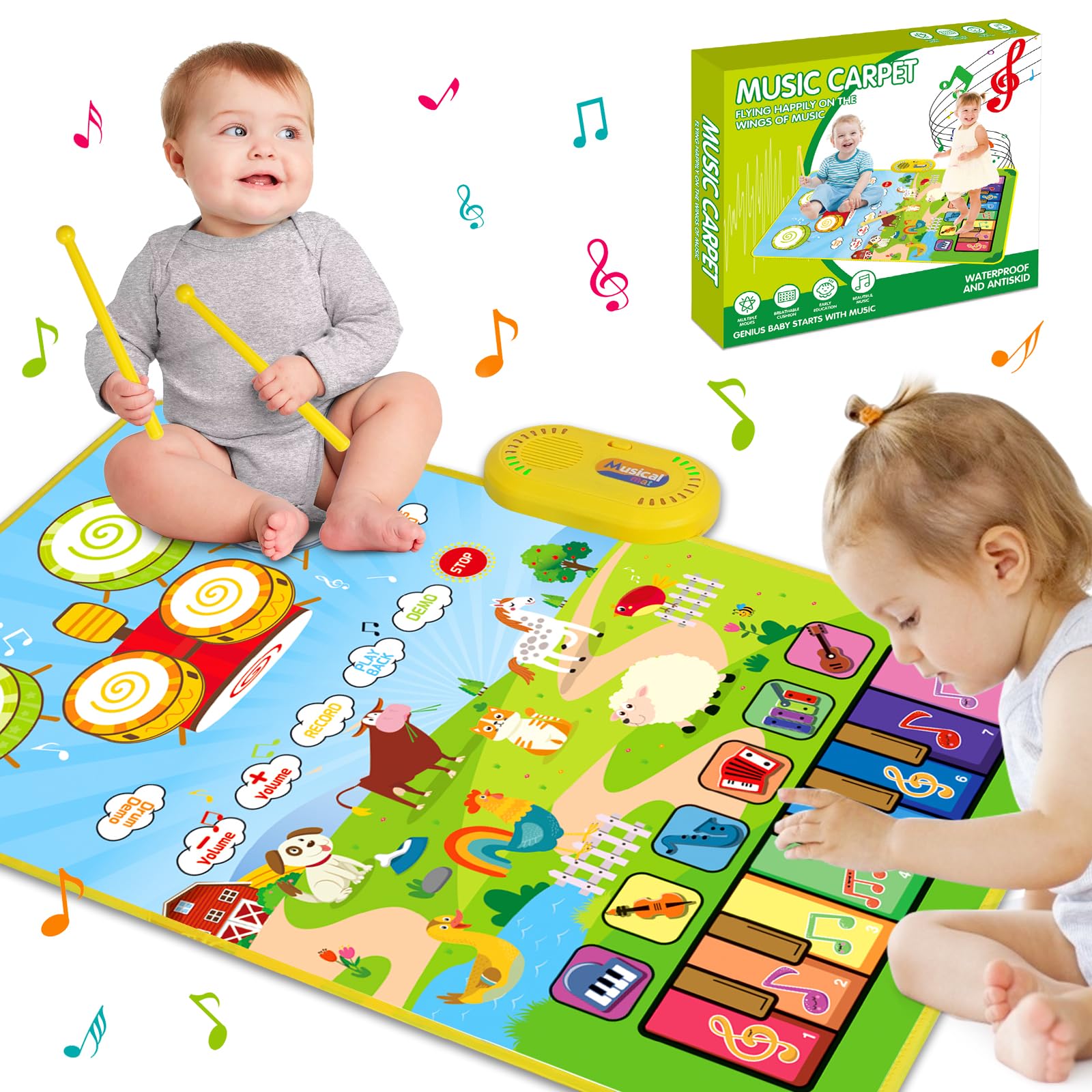Considering incorporating musical toys into your child’s playtime but curious about their underlying benefits? You’re not alone. Many parents intuitively understand the joy and engagement musical toys bring but might not fully recognize the depth of developmental advantages they offer.
Fortunately, musical toys, whether they’re simple rattles or more complex instruments, play a pivotal role in a child’s holistic growth.
Drawing from my expertise in child development and the benefits of music education, I’ve orchestrated a comprehensive guide that delves into the multifaceted benefits of musical toys. This guide will explore cognitive, emotional, physical, and social benefits, among others.
Let’s harmonize our understanding and uncover the symphony of developmental perks that musical toys can bring to young maestros.
Key Takeaways
Musical toys play a pivotal role in a child’s development. They not only entertain but also offer a plethora of developmental benefits.
| Benefit | Description |
|---|---|
| Cognitive Development | Engaging with musical toys can boost memory, attention, and thinking skills. |
| Motor Skills | Instruments like drums or xylophones enhance hand-eye coordination and fine motor skills. |
| Sensory Development | Musical toys stimulate the auditory senses and can also offer tactile experiences. |
| Emotional Expression | Playing with musical toys allows children to express their feelings and emotions. |
| Rhythm & Timing | Interacting with musical toys helps children understand rhythm, timing, and sequencing. |
| Creativity | Making up tunes or songs fosters creativity and imagination. |
| Language Skills | Singing along or listening to lyrics can boost language development and vocabulary. |
| Math Skills | Understanding beats, sequences, and rhythms can enhance mathematical thinking and pattern recognition. |
| Social Skills | Playing instruments or singing in groups teaches teamwork, sharing, and cooperation. |
| Cultural Awareness | Exposure to various musical instruments or styles can introduce children to different cultures and traditions. |
| Boosts Concentration | Engaging with a musical toy requires focus, thus helping improve concentration. |
| Enhanced Memory | Remembering tunes, lyrics, or rhythms can aid in memory development. |
| Bonding | Singing or playing musical toys with caregivers or parents can strengthen emotional bonds. |
When introducing children to musical toys, it’s crucial to ensure they’re age-appropriate and safe. Encourage exploration and creativity, and consider joining in for a fun, shared musical experience.
Why musical toys are good for babies and toddlers
Music is an integral part of our society and culture.
It’s the universal language that brings people together regardless of beliefs, backgrounds and race.
It pervades our daily lives in various forms of media through the radio, smartphones, television and more.
Some people express themselves and emotions through music.
Studies suggest that one of the first senses that babies develop is their sense of hearing.
Listening to music is also an essential part of fetal development which is why expecting mothers are encouraged to listen to music.
The developmental benefits of music extends to when babies are born.
Musical toys are highly recommended during a children’s early development.
At an early age, children are already exposed to music.
They listen to nursery rhymes, lullabies and even made-up songs.
So introducing musical toys to their playtime is the only logical step.
Allowing little children to play and make music using musical toys help them learn in a variety of ways.
These toys are more than just toys because they not only entertain but also help children learn and set their mood.
Let’s take a closer look at why you should let your children play with musical toys.
Creativity & Imagination
Musical toys foster creativity and imagination. Children are inherently curious with the things around them and they are most likely to enjoy the music they create when playing with musical toys.
Developing children’s creativity and imagination through play at an early age sets them up for bigger things in the future. These skills allow them to discover new things and come up with solutions to real life problems when they grow older.
Some of the most popular singers and musicians were exposed to music at an early age so who knows your children might become one of them in the future.
Gross & Fine Motor Skills
Gross motor skills is defined as the ability of the body to use a large group of muscles to perform a specific action like standing, walking, jumping and many more.
Fine motor skills on the other hand (no pun intended) is the skill to use the muscles in the hand and fingers in coordination with the eyes to perform tasks like grasping and holding.
Musical toys like xylophones and maracas encourage children to use fine motor skills to create music and sit up straight while doing it.
When little children play and do things repeatedly, it can result in improvement of essential skills like fine motor and gross motor skills.
Instruments like drums or xylophones aren’t just fun; they are instrumental in honing a child’s motor skills. Striking a drum or hitting the right key requires hand-eye coordination and refines fine motor skills.
The repetitive motions, combined with the joy of producing sound, provide a delightful way to enhance physical development.
Cognitive & Sensory Development
Many studies have shown that playing with musical instruments at an early age increases brain activity which can lead to rapid brain development and creates neural pathways in the brain.
This growth helps with children’s cognitive development especially in areas of language and communication, problem-solving and analytical thinking.
As children create and experiment with music, they also improve their listening skills.
Musical toys serve as a feast for the senses. They stimulate the auditory system, enhancing a child’s ability to discern different sounds and tones.
Many musical toys come with varied textures and components, offering tactile experiences that further enrich sensory development.
Emotional Expression
Music is a universal language of emotion. Playing with musical toys provides children a platform to express their feelings and emotions.
Whether it’s the triumphant beat of a drum or the melancholic notes of a keyboard, children learn to channel their emotions through sound, fostering emotional intelligence.
Rhythm & Timing
Musical toys introduce children to the foundational concepts of rhythm, timing, and sequencing.
By tapping a drum or shaking a maraca in time with music, children develop an innate understanding of rhythm, which is crucial not just in music but also in understanding the patterns of language and movement.
Language Skills
Engaging with musical toys often involves singing along or listening to lyrics.
This interaction can significantly enhance language development, enriching vocabulary and improving pronunciation. Music’s rhythmic nature also aids in better sentence structuring and intonation.
Math Skills
At first glance, music and math might seem worlds apart.
However, understanding beats, sequences, and rhythms in musical toys lays the groundwork for mathematical thinking. Recognizing patterns in music parallels the skills needed for pattern recognition in math.
Social Skills
Musical activities, whether it’s group singing or playing instruments together, are communal.
Engaging in these activities teaches children valuable lessons in teamwork, sharing, listening, and cooperation.
Cultural Awareness
Music is a reflection of culture. By exposing children to different musical instruments or styles through toys, we introduce them to the rich tapestry of global cultures and traditions.
This early exposure fosters open-mindedness and cultural appreciation.
Boosts Concentration
Playing a musical toy isn’t just about making noise; it requires focus.
Whether it’s following a tune or mastering an instrument, the concentration developed during these activities has far-reaching benefits in academic and other structured tasks.
Enhanced Memory
The world of music is filled with patterns, tunes, and lyrics.
As children engage with musical toys, their brains work overtime to remember these sequences, strengthening their memory muscles and enhancing recall.
Bonding
Music has a unique way of bringing people together.
When caregivers or parents sing, dance, or play musical toys with children, it creates shared moments of joy, laughter, and connection, deepening emotional bonds and fostering a sense of security.








